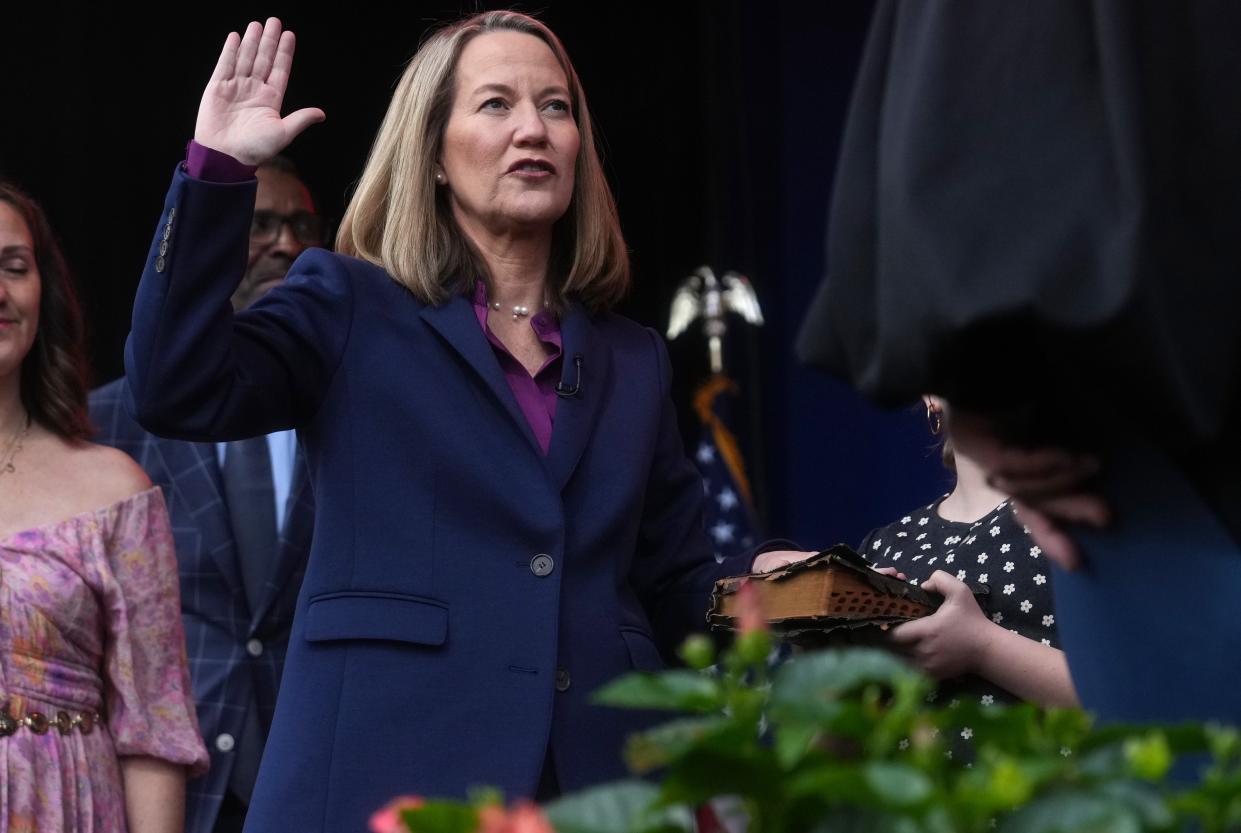Arizona allows private interests to fund politicians' legal costs — and keep it secret

- Oops!Something went wrong.Please try again later.
Arizona's largest power company, once a punching bag for Kris Mayes when she was a utility regulator, paid $25,000 to support Mayes' defense against a legal challenge to her November election as attorney general, company records show.
The contribution last year from Arizona Public Service Co.'s parent, Pinnacle West Capital Corporation, to Mayes' legal fund covered just a sliver of a bill for attorneys that Mayes estimated to total more than $300,000.
It is noteworthy not just because of Mayes' political history as a frequent foe of APS, but also because Arizona law allows private companies, nonprofits and other groups to contribute money for candidates' legal fees without any reporting to the public about who is donating how much.
APS voluntarily disclosed the contribution on its corporate website in April. Without doing so, or without a candidate volunteering such information, Arizonans have no way to know who is paying the legal fees for sitting officeholders, or the failed candidates who turn false claims of election fraud into fundraising opportunities. Government watchdogs warn of the possible influence such money might have on policymakers.
Mayes is not alone in raising money from outside sources to cover legal fees — it's a common practice. Also common is an unwillingness to voluntarily disclose who is paying, The Arizona Republic found when it asked officeholders and candidates for fundraising details.
One transparency group recommended erasing the exemption that allows donations for legal fees to stay secret two years ago, well before long and expensive legal battles from Republicans over losing election results became the norm. Broadly speaking, limits on money in politics are meant to curb corruption or the appearance of corruption, according to Patrick Llewellyn, director of the state campaign finance program at the Campaign Legal Center.
“These limits help ensure that officeholders are accountable to the people that they represent, and not whoever can write the biggest check,” Llewellyn said. “When certain activities are excluded from what counts as a contribution, that can create a significant loophole in allowing potentially huge amounts of money to flow from wealthy special interests directly to candidates.”
Mayes says her record with APS speaks for itself
For students of the state’s political history, the donation from APS might stand out given Mayes, as a member of the Arizona Corporation Commission from 2003 to 2010, was one of APS’ toughest critics.
Asked how she would prevent such donations from influencing her decisions as the state’s top prosecutor, or her office of about 650 employees, Mayes quipped about her history with APS.
“I don’t think there is a soul in Arizona who thinks APS is going to influence Kris Mayes, and I’ll leave it at that,” she said. Pinnacle West didn't answer a question about why it donated to Mayes' defense, but said in a statement its political spending advocates for “sound, forward-looking public policy.”
Mayes, in a brief interview in May, said she was forced to keep fundraising because defeated GOP candidate for attorney general Abe Hamadeh continues a “frivolous” effort to challenge his 280-vote loss in court. The case has continued well past a Mohave County judge dismissing Hamadeh’s claims in December, with Hamadeh losing his bid to get a new trial in the case just last week.
“How many times do I have to win this election?” said Mayes, a Democrat. “I had to set up a legal defense fund that I don't want to have to be raising money for, and I'm doing everything I can to focus on my job, which is protecting the people of Arizona.
“It's not something I want to have to be raising money for at all,” Mayes said. Mayes' campaign treasurer DJ Quinlan said challenges like Hamadeh's come at a cost to taxpayers, too, because they name counties as defendants that are entitled to legal representation.
Mayes said she hoped to refund the donations, if the judge ultimately orders Hamadeh to pay her legal fees, and was open to disclosing who paid for her legal defense after the case is closed.
For subscribers: This Arizona Republican congressman is taking a bipartisan approach to legislating
Candidates can voluntarily disclose donors, but don't
In 2016, Arizona lawmakers amended the state’s tome of campaign finance laws amid a bitter debate over dark money, the political spending by organizations that keep their donors anonymous.
As part of those changes, the standing practice of candidates not disclosing donations to cover legal costs was written into law. An exemption for accounting costs also was included.
Candidates and officeholders can voluntarily disclose their spending and fundraising as it relates to legal fees, but none contacted by The Arizona Republic chose to do so.
A spokesperson for Hamadeh declined to respond to questions about how much money he had raised or provide details about who was bankrolling the ongoing effort. Spokespeople for Kari Lake, the losing GOP gubernatorial candidate, did not respond to a similar request. Lake frequently uses her ongoing election challenge to solicit donations to her Save Arizona Fund for her legal defense and other projects.
Arizona Gov. Katie Hobbs’ campaign wouldn’t discuss its arrangement for legal costs to defend against Lake's challenges, which according to court records cost over $550,000 as of December. That bill is an undercount, as it doesn’t include two appeals and a three-day trial earlier this year.
Hobbs’ senior adviser Joe Wolf declined to comment on behalf of the campaign. Hobbs was one of several Democrats who as a state senator in 2016 opposed the campaign finance changes, though objections to it were largely over other spending provisions and not the exemptions.
For subscribers: Gov. Hobbs gets more financial backing from APS after utility supported Kari Lake in election
'Potentially huge amounts of money going to candidates'
The Campaign Legal Center, the nonpartisan Washington, D.C., group that advocates for transparency and campaign finance reform, in 2021 evaluated Arizona’s laws at the request of then-Secretary of State Hobbs.
One of the group's recommendations was to narrow the broad exemption for legal costs to apply only to compliance with state campaign finance law or when a law firm provides pro-bono representation that is not paid by an outside entity.
"In short, these exemptions create a backdoor for secret quid pro quo exchanges in Arizona politics and deny the public important information about money raised and spent by candidates and committees," the report reads.
The recommendation, which would bring Arizona more in line with rules for federal candidates, fell on deaf ears at the GOP-majority Legislature, however.
As it stands today, candidates for state office in Arizona can accept only $5,300 from individuals in any election cycle, and they cannot take money directly from corporations. The candidates must publicly report those donations, which any Arizonan can go look up online.
But there is no cap on donations, no public reporting requirement, and no prohibition on corporate donations when the money is used for legal matters.
“When it's in context of potentially huge amounts of money going to candidates or officeholders … the public has a right to know who's providing that funding, but also that there should be safeguards to limit the amount of money that is coming in at those situations,” said Llewellyn, of the Campaign Legal Center.
Arizona lags behind rules for federal candidates
The changes to Arizona's law seven years ago made the state stand apart from the rules governing candidates for federal office, which are often looked to as a guide when state law is silent on a specific issue.
The Federal Election Commission, which oversees federal campaign finance law, allows funds donated to a candidate campaign to pay for legal expenses related to the candidate or officeholder’s activity.
The candidates must publicly report those contributions, they cannot come from corporations or nonprofits, and are subject to caps of $6,600 per donor in the upcoming election cycle, according to the FEC. Those same limits and reporting rules apply to money donated to accounts set up to help pay for recounts and election contests, an FEC spokesperson said.
If those federal rules applied to state offices in Arizona, APS' donation to Mayes wouldn't be allowed.

Legal defense funds for other purposes are treated differently by the FEC and don’t have requirements to report. That doesn’t mean they are entirely without rules, however.
The ethics committees in both the U.S. Senate and House of Representatives must give permission to a member to create a legal fund, which is then subject to caps on donations and require regular public reporting, according to the committee rules in each chamber.
The complex web of how candidates and officeholders bank their money has lately entwined major political controversies, including a concern that GOP candidates are pushing false claims of fraud as a vehicle for fundraising. Former President Donald Trump faced such allegations during a U.S. House committee's investigation of his ties to the Jan. 6, 2021, violence at the U.S. Capitol.
For subscribers: The Jan. 6 Capitol riot probe is targeting Trump. Here's what to know about Arizona's role
Committee member Rep. Zoe Lofgren, D-Calif., charged last year that Trump misled Americans, drawing $250 million in donated money for a legal fund that was never set up. That money, according to testimony by the committee’s investigators, instead went to Trump’s Save America PAC, which then distributed cash to Trump’s businesses and his allies.
Trump’s use of the money prompted good government groups, like the Campaign Legal Center, to call on the FEC to set rules for legal funds. Candidates should only use that money for post-election challenges and limits on how they can spend any leftover money should exist, the center argued.
Ensuring that candidates and officeholders are spending the money on legal costs — and not other interests — is one reason to add reporting requirements in Arizona, said Terry Goddard, a former Arizona attorney general and transparency proponent who ran the 2022 ballot measure requiring disclosure of dark money in advertising. The ballot measure, Proposition 211, won with over 70% of Arizona voters in favor.
Goddard said legal expenses are appropriately considered under the law in a category separate from contributions that seek to influence the outcome of an election, but that they should have reporting requirements.
“I think it's appropriate to have it in a different category, but it's not appropriate to have it totally without accountability,” he said.
“As a disclosure advocate, I think that’s a mistake.”
Reach reporter Stacey Barchenger at stacey.barchenger@arizonarepublic.com or 480-416-5669.
This article originally appeared on Arizona Republic: Why Arizona law allows secret funding of politicians' legal costs

